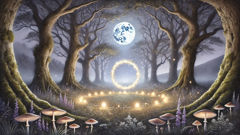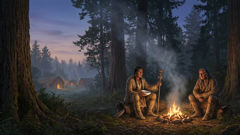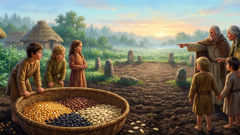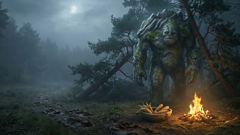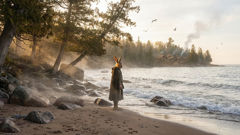Introduction
Between sea-salt mornings and the long shadows of oakwood, Welsh hills hold a hush that is not silence but waiting. Locals call it the maidens' breath, the whisper of music coaxed from moss and stone, the hint of footfalls that vanish at a glance. For centuries across the scattered farms and the stone circles it was understood without being written: the hills had neighbors. They were fair-haired and fine of face, barefoot on dew, and their laughter could lift a child's fever or steal a sheep from a pen. They called themselves the Tylwyth Teg—fair family, folk of the hollow and the hill—though travelers and clergy have named them with other titles over the years: the fair folk, the little people, the gentles. Ancient as the rivers, they inhabited a mirror kingdom that sits parallel to the human one, visible at the turn of a lane, in the window of dusk, or where sunlight threads through a ring of toadstools. This story gathers the old descriptions, the rules and remedies that kept mortals safe, the images of nightly courts that rose like pale hearths beneath the hills, and a single, prolonged encounter between a woman named Elin and a prince of the Tylwyth Teg. It is not a simple fable of kindness rewarded or villainy punished; it is a tapestry of subtle agreements, small cruelties, and the stubborn tenderness that ties people—both mortal and fae—to place. Through retelling, the myth becomes a living map: how one might find the otherworld, how one might be found, what gifts are truly gifts, and what the fair ones truly ask for in exchange. You will read description and detail that aim to summon the texture of moss, the scent of peat, the hush of a procession when lamps go out and the same lamps begin to glow on a different shore. The text that follows blends lore and invention, drawn from the rhythms of Welsh speech and the weather-worn beliefs of those who have listened most carefully to the land. I offer this as both a cultural companion and an imaginative journey into an old world where beauty dazzled and bargains weighed heavy.
Origins, Nature, and Court: Who the Tylwyth Teg Were
The Tylwyth Teg arrive in story like weather: unassailed by one origin and yet fitting into many. Scholars and story-keepers place them among the retinue of the Celtic Otherworld—Arawn's hall, Annwn's feasting tables, the green lands beneath mist. Yet they are not a single entity; they are a pattern, a family likeness repeated across valleys and parishes. In speech they are described as fair—a term that covers hair like sun-bleached wheat, skin that takes light but is not warmed by it, and faces both young and ageless. They ride the edges of fertility and decay, belonging to seasons rather than years. The Tylwyth Teg's domains are described as a braided geography of barrows and hills, hollow oaks, caves with silver streams, and lakes where dawn's light breaks differently. Their halls glitter with shells and mother-of-pearl, or with the dull charm of worked stag horn and greenstone. Lamps that glow without smoke hang from rafters that smell faintly of wild thyme. In one parish you might hear of their music—harps of bone and wire, voices like a choir of small bells—and in another of their craft: weaving cloth so fine it catches moonlight, forging small knives whose edges hold their own light.
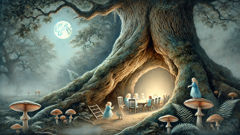
They are a court as much as they are a people. Accounts speak of a queen or a king, though sometimes leadership is a council. The titles change—some call him a prince, some a lord of the hill, some speak only of the Lady who is beautiful and terrible in equal measure. Their manner of rule follows a courtly logic: ritualized, precise, and richly aesthetic. They feast often and strangely; a mortal brought to their hall might find tables bowed with food that looks like what a human expects—roasted meat, bread, cream—yet the taste is off, or too perfect, or folded with otherworldly textures that bewilder. Time behaves differently in that hall: a night may be a year away from home, or ten years may slip through the fingers like water when a mortal returns. Thus one of the oldest rules in the lore is this: never accept food or drink in the fairy hall if you plan to return unchanged.
They are also cunning negotiators of attention. Bargains are a hallmark. A child returned to a mother with eyes too bright may have been swapped: a changeling left in the crib, infant and fae child indistinguishable until small details reveal the substitution. In other tales the Tylwyth Teg give a house prosperity for a decade in exchange for one night of music played by a human fiddler, or they borrow a mortal's skill and then keep it, requiring the mortal to adapt. They prize certain offerings: small, earnest gifts like a comb, a strip of fine cloth, or a half-loaf of bread. They disdain sloth and ingratitude; a thrown-off insult might echo for generations. But the fair folk are not uniformly cruel. They can be guardians of paths, unseen protectors of flocks when mortals show them respect—leave a saucer of milk at the stile, and a line of lambs might keep healthier all season. Many of the rules that villagers kept were pragmatic, the result of generations of trial and error: never whistle on a lane at night, never speak the Tylwyth Teg's true name when they ask it, never count the number of those in a dancing ring, and if you find their gift—an old brooch or a tiny silver bell—return a blessing and never boast of the find.
Their relationship to landscape is intimate. Hills are not inert lumps but bones of the world where their courts rest. Certain sites are well marked in local memory: Beddau’r Gwyr (the graves of men) near a river, a hollow by a standing stone, an island in a lake where fog collects in high summer. These places are thresholds: a walk at dusk by one of these thresholds may leave a mortal knocked off his path into another season. In many stories the Tylwyth Teg guard thresholds to keep their culture distinct; to cross deliberately is to risk transformation. The fairy lights that lead shepherds away are both lure and labyrinth, a test of whether a mortal is steady in purpose or easily tempted.
The Tylwyth Teg's relation to human law and church is fraught with adaptation. In medieval and later folk accounts, a priest or wise woman becomes the mediator: a blessing or a charm can fix the mischief the fair folk have made. Christianity layered itself onto older beliefs, and many villagers learned to observe a double etiquette: leave a slice of cake at Samhain, say a prayer at the waystone, tie a ribbon to a thorn bush to mark a promise to the other side. But warnings persisted. A priest who scorns the old ways might find his church bell ring without a hand; a mason who stole a fairy's stone might watch the mortar loosen. The Tylwyth Teg, in this frame, are not simply inverted humans; they are a moral ecology focused on balance: take, but do not despoil; admire, but do not possess; dance, but do not forget your feet in your own land.
Within the lore, physical descriptions are often paired with telltale signs: a person who has been touched by the Tylwyth Teg might forget hours, crave food that is cool and sweet, or develop a small frostiness at the cheek under the skin. Those who live close to their domains learn to read such signs. There is also a practical list of antidotes and safety measures passed from neighbor to neighbor: iron nails driven into thresholds—though iron is not always a fail-safe; carrying bread baked with salt from a hearth before midday; reciting psalms; planting rowan trees near the door. The line between faith and habit blurred until using these measures felt like breathing. Stories cautioned that the most dangerous bargain is the one that looks like salvation: a father who trades a child for prosperity, a widow who accepts a fairy's gold to lift her farm's fortunes without reading the clause.
Over time, as roads hardened and factories and modern things rolled into valleys, the presence of the Tylwyth Teg diminished in daily talk, though not in memory. People spoke differently of them: as gentle tricksters on market day, or as the cause of misfortune when livestock fell ill. The fair folk's cultural role shifted, but the old warnings retained their sharpness. The Tylwyth Teg remained a mirror for communities to examine greed, reverence, and the cost of beauty. Their myth preserved a moral ecology where the land itself resists exploitation and where respect—small and regular—keeps doors closed to mischief and open to blessing.
Elin and the Prince: A Tale of Bargains, Music, and Return
Elin was a woman of a single village that remembered the names of its lanes and kept its stories. She lived on the slope of a hill that the neighbors called Lôn y Garn, where the stone wall ran like a spine and the dew gathered in the mornings until the fields looked as if frost had been careful. She was neither remarkable nor insignificant: a weaver by trade, with hands that could set a pattern into cloth so that light seemed to move across it. People said she had an old way of humming when she worked; the tune kept time with the shuttle. Her husband had been taken by fever some winters before, and since then her days had been stitched from small economies and stubborn gentleness. It was the sort of life that attracts the eye of the Tylwyth Teg, for they prize what humans take for granted: competence, beauty of small things, and grief that does not harden into malice.

On a late-summer evening when the air held the sweetness of hay and the lanes were thick with the scent of crushed honeysuckle, Elin followed a path to a well she knew for dyeing skeins. The route took her through a hollow beneath an oak that the elders said was older than the village. She went deliberately, thinking of a pattern she wanted to weave for a child—blue threads that would catch a child's laugh. She left a small scrap of bread at the crosspath, the habit of a lifetime, and then paused because she heard music she had not known was there. It was not a single instrument but a layering: a high whistle like summer wind, a low drone like a trapped bee, and something like the sound of small bells hidden in a pocket. A circle of lights moved around the base of the oak.
Elin, who had always been able to restring a loom by moonlight, felt her limbs steady and stepped forward. That was the kind of choice the old stories remember: some retreat at the first step of fairy light; some are drawn toward it like sheep to a new grass. Elin moved easily, as if her life stitched her there. At the center of the ring there was an arch of woven grass and silver, and beneath it a figure sat on a stone as though it had been waiting. He was taller than she expected, and the air around him was so clear it seemed to knock dust from her hair. He had hair like light on barley and eyes that were the sort of green that remembers spring. He wore a frock embroidered with thread that looked like river-silk and he held a small harp.
"Elin of Lôn y Garn," he said, and the name was an offering—her village's syllables falling from a mouth that shaped language as if it were a woven pattern. "You mend what is old and you hold memory in your hands. Will you come to the court tonight?" That was a word that in some tales meant a trap, and in others an honor. Elin felt the claim of the night like a thread tugging on her fingers. She bowed her head and said nothing for a long breath.
He smiled, and his teeth were pale as shell, and he did not ask for her name again. The music rose. She found herself in the circle, not by force but because the world had folded like cloth and given new space for her feet. The court beyond the tree was a hall of low stone and green light. Long benches glimmered with quiet food, the air smelled of wild herbs, and lanterns blinked like distant fireflies. There were other figures—some with faces thin and ethereal, others rounder and older than the hills. A queen sat at the high place, her coronet like a ring of dew. The prince—the man who had asked her—motioned for a place at the bench and placed his harp at his knee.
The laws of such nights are many and subtle. Elin remembered from the stories the cautionary lines: do not accept bread, do not sleep, do not reveal your name if asked thrice. Yet the music warmed where her grief had been a cold stone. He played things that made her hands ache with the desire to weave, patterns of melody that taught her new ways to put thread through warp. He spoke of textures as if they were people and offered her a single silver pin, small as a needle's eye and bright as moon on a pond. "For the fine work you do," he said. "So that your cloth will not fray." It was a gift according to Tylwyth Teg terms—beautiful, useless to boast of, and dangerous.
Elin took it and did not eat. The courtiers watched her fingers with an interest that was almost hungry. The queen leaned forward once and laid a hand on Elin's wrist; it was cold and light. "We do not take what you need, Elin. We offer what you want. Choose." There was a cadence to the words, as if the language itself was a contract. Elin thought of her small loom, the children in the village who wore patchwork, the nights she kept the embers alive. She thought of the way the pin would slip silk through the strands like a small miracle. She accepted the gift, as most people do in these tales—the choice, after all, was not immediate coercion but the slow, quiet reasoning of need.
She returned at dawn to her own hearth, and neighbors said she looked as if she had been at a feast; her cheeks held a light that was not sun. She tucked the pin inside her basket, and by morning her hands had new skill. Cloth she wove that season shimmered with a delicate sheen. People came to buy from her who had not come before; her coin doubled, then tripled. The pin worked. The Tylwyth Teg had kept their bargain. But so had the world its rules. The first change was small: Elin began to notice that her dreams were long and full of brisk air from places she had not been. Then that winter a child of the village—Tomos, a boy who had been left in her care for an afternoon—woke and could not remember his mother's name for an hour. People whispered of changelings and stolen days but none accused Elin.
Months passed. The pin's gift turned her cloth fine, then thinner than needed. When she wrapped a child in one of her shawls she felt it ghost against the child's cheek as if some other hand brushed there. She began to count moments and to find that hours vanished if she hummed the new tune the prince had taught her. Her neighbor Gwen suggested a charm, the sort that had been used when a cottage's milk soured overnight: hold iron on the threshold and say a psalm. Elin did, but the song the prince had placed in her folded around the words and made them feel like paper in a flood.
Rumors grew into consequence. People said that the Tylwyth Teg had made her a favored woman and that favor had cost them more than cloth. The magistrate's son, who had once courted her, said she had been bewitched. A pair of sheep went missing across the valley, and tongues tied the misfortunes together. People who believe in bargains are quick to believe in balance. Elin felt their gaze as if she wore a cloak with patches of their suspicion. Without being asked, the prince returned to her door on the eve of spring. He stood under the low eaves and did not play. "You took what we offered," he said simply. "You must give in kind. We do not break law nor custom. You were not tricked; you bargained. What will you offer?"
Elin's answer was not a tantrum but a pattern unraveling. She thought of all the quiet ways she had kept her house; of the small kindnesses and of the nights when cold crept near the children. She thought of the way the music had changed the weave in her hands. She had learned a lot in the year: how to pay attention to the edges of bargains, and how small gifts become deep debts. She offered him a thing neither of them expected—a day. Not a day of leisure or a day of harvest, but one tethered to the land: she would walk the boundary of the village at first light and make offerings at every stile, every thorn, each cross-roads. She would sing the old protective songs, mend one bed-sheet for each household, and set aside bread for the hollow's birds. It was a day of repair and ritual, a weaving of common life. The prince listened and then agreed.
He asked for one further thing: a story of her heart. Tell me who you were before the weave, he said, and say nothing of the bargain. So she told him about her husband—how he had kept the hens, how his laugh had been like a bell when the rain started—and about grief, about the way a woman can fold herself into a life that goes on without an answer. She told him about her loom, about the pattern she would have given to her daughter had she had one. When she finished, the prince did something that had never happened in the memory of her village: he wept, small drops that shone like silver on his fingers. "We do not weep in your way," he said. "But we remember the sound of what you give us: your care." It was not flattery. It felt like truth. He lifted the silver pin and placed it back in her hand.
They kept the bargain. Elin's day of repair was work of spirit as much as muscle. She walked the boundaries and sang, mended and blessed. At the hill's foot the Tylwyth Teg placed, by their ancient custom, a single gift in return: a small ring of spun moss threaded with a seed pod, and the promise that no child would be taken from the village for three generations. The villagers called that promise extraordinary and marked it with a feast. Elin's cloth retained a faint sheen but not the hungry perfection it once held. She kept the new melody but learned to wrap it with other songs. The bright days returned. And yet, the story does not end with neatness. The price of the bargain was not measured only in gold or in days; it had altered how Elin perceived the world around her. She would sometimes catch herself listening for the prince's harp and finding empty air; she would sometimes wake with the sense of two summers stacked on top of each other. The Tylwyth Teg had given and taken in equal measure. They were not villains in her tale; they were other, and otherness asks a kind of accounting.
Elin aged as the village did, with patience and small rebellions—refusing once to sell a pattern to a trader who would have shipped it to a distant town, or challenging a neighbor who wanted to clear a hedgerow where fairy lights had been seen. At her deathbed, they put her old pin beside her, and the children of her family told the story at weddings and at wakes. They told it for the lesson that the Tylwyth Teg give: respect the land, tend the boundaries, and remember that beauty given by the otherworld may come wrapped in a cost. They also told it for the subtler moral: bargains are not always traps if a person remembers to trade with reciprocity. Keep the bread for the crossroads, mend the fences, sing the old songs, and in return be ready to offer a small day of repair to the unseen neighbors. The Tylwyth Teg would nod and perhaps place a bright feather by the hearth for moral touchstones such as these; they would do so with no rancor, because they live by cycles and patterns, not human notions of eternal justice.
Conclusion
The Tylwyth Teg, in Welsh memory, are a reminder that the world carries more than convenience and measure. They guard thresholds where the living must be attentive, not merely because they are capricious, but because an economy of care once existed between land and family, craft and season. Respect was currency: leave a cup at the stile, mend what you have broken, speak kindly of the land, and do not brashly proclaim the tiny wonders you have found. The myths remain useful because they teach a particular humility. The fair folk reward small craft and good attention and punish heedlessness with loss measured not in drama but in quiet erosion—misshapen luck, a child who forgets home for a day, a sheep that wanders. Their beauty is the dangerous kind: luminous and demanding. In a modern world that often seeks profit before pattern, the tales of the Tylwyth Teg offer a different ledger—one scored in favors given and returned, in gratitude, and in the weekly acts of keeping. If you walk lanes at dusk in Wales now you are unlikely to be swept into a court, yet the old customs persist in gestures: a ribbon at a tree, an offering left at a hollow, a psalm muttered in the storm. These survive not only as superstition but as ways to tether community to its landscape. Take these stories as you would any map: useful for finding thresholds and warnings, generous in their language, and merciless where greed forgets its cost. The fair folk remain in the edges and in the praise songs, and their myths continue to ask us to imagine that our deeds have shape beyond our sight. To live with such a belief is to choose a small attentiveness in daily life—to mend rather than waste, to keep pace with seasons, and to accept that some gifts among the world are luminous because they require tending in return.

